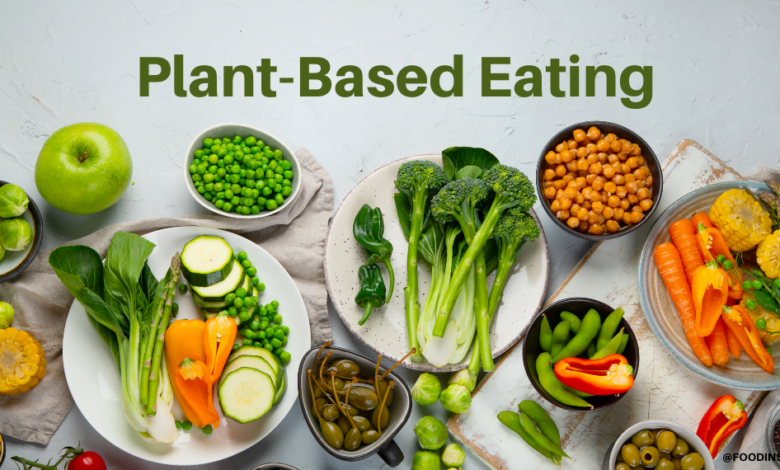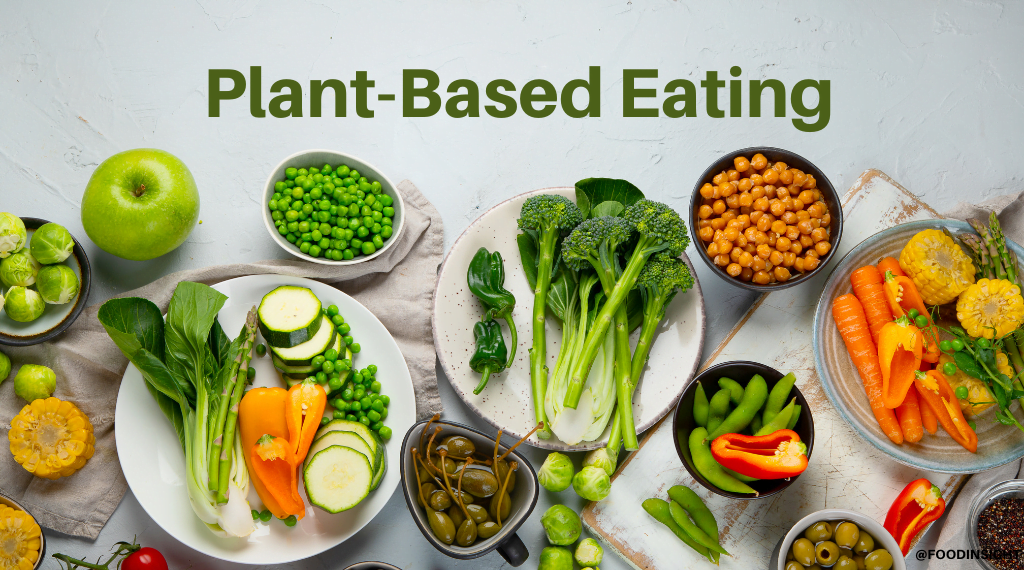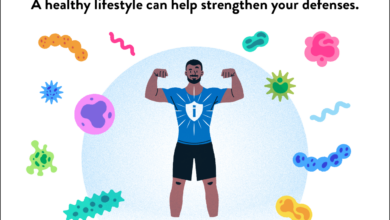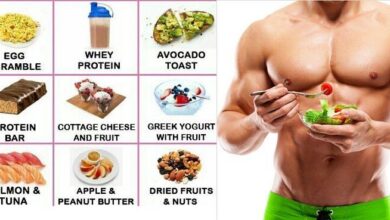
5 Things Dietitians Want You To Know About Plant-Based Diets
5 things dietitians want know plant based diets – 5 Things Dietitians Want You To Know About Plant-Based Diets: You’ve heard the buzz about plant-based eating, but what do the experts really want you to know? From the differences between vegan, vegetarian, and flexitarian diets to the importance of protein sources, this article dives into the essential information every plant-based eater should be aware of.
Plant-based diets are becoming increasingly popular, and for good reason. They offer a plethora of potential health benefits, including reduced risk of heart disease, type 2 diabetes, and some types of cancer. However, it’s crucial to approach plant-based eating with knowledge and planning to ensure you’re meeting your nutritional needs.
Understanding Plant-Based Diets

Plant-based diets have gained significant popularity in recent years, driven by concerns about health, the environment, and animal welfare. These diets encompass a wide range of eating patterns, from completely vegan to those that simply emphasize plant-based foods. Understanding the nuances of these diets is crucial for both individuals considering them and dietitians providing guidance.
Types of Plant-Based Diets
The term “plant-based” encompasses a spectrum of dietary approaches, each with its own set of principles and restrictions.
- Vegan:This is the most restrictive plant-based diet, excluding all animal products, including meat, poultry, fish, eggs, dairy, and honey. Vegans rely solely on plant-based foods for their nutritional needs.
- Vegetarian:Vegetarians abstain from consuming meat but may include other animal products like eggs, dairy, or honey. There are several types of vegetarian diets, including:
- Lacto-ovo vegetarian:Includes dairy and eggs.
- Lacto vegetarian:Includes dairy but excludes eggs.
- Ovo vegetarian:Includes eggs but excludes dairy.
- Flexitarian:This is a more flexible approach that emphasizes plant-based foods but allows for occasional consumption of animal products. Flexitarians may choose to eat meat or poultry a few times a week or only on special occasions.
- Pescatarian:This diet includes fish and seafood but excludes other types of meat, poultry, and often eggs and dairy.
Potential Health Benefits of Plant-Based Diets
A growing body of research suggests that plant-based diets can offer significant health benefits, particularly in reducing the risk of chronic diseases.
Dietitians want to know about the variety of plant-based foods you eat, how you manage protein intake, and the sources of essential nutrients like iron and vitamin B12. A delicious and nutrient-packed dish like shrimp asparagus zoodle pasta showcases how to incorporate diverse plant-based ingredients while still enjoying a satisfying meal.
Understanding these factors helps dietitians ensure a plant-based diet meets your individual nutritional needs.
- Reduced Risk of Heart Disease:Plant-based diets are typically lower in saturated fat and cholesterol and higher in fiber, which can help lower blood pressure and cholesterol levels, reducing the risk of heart disease.
- Lower Risk of Type 2 Diabetes:Plant-based diets can help regulate blood sugar levels, reducing the risk of developing type 2 diabetes.
- Reduced Risk of Certain Cancers:Some studies have linked plant-based diets to a lower risk of certain cancers, such as colorectal and breast cancer.
- Weight Management:Plant-based diets are often lower in calories and fat, which can aid in weight management.
Common Misconceptions about Plant-Based Diets
Despite the potential health benefits, plant-based diets are often surrounded by misconceptions. It’s important to address these concerns with evidence-based information.
- “Plant-based diets are not nutritionally complete.”This is a common misconception. A well-planned plant-based diet can provide all the essential nutrients, including protein, iron, calcium, and vitamin B12. It’s crucial to include a variety of plant-based foods to ensure adequate nutrient intake.
- “Plant-based diets are too restrictive.”While some plant-based diets, like veganism, are more restrictive than others, there are flexible options like flexitarianism that allow for occasional consumption of animal products.
- “Plant-based diets are expensive.”This is not necessarily true. While some plant-based foods, like organic produce, can be expensive, there are many affordable plant-based options available, such as beans, lentils, rice, and vegetables.
Nutritional Considerations
Plant-based diets, while offering numerous health benefits, require careful planning to ensure adequate intake of all essential nutrients. This section explores key nutritional considerations for plant-based eaters, highlighting potential deficiencies and providing strategies for a balanced dietary approach.
Wanting to know what dietitians want you to know about plant-based diets? It’s a great question! Dietitians are all about ensuring you get the nutrients you need, and a plant-based diet can be very healthy, but it requires planning. The key to staying motivated when starting any new habit, like a plant-based diet, is to find strategies that work for you.
Check out this helpful article on how to stay motivated when starting a new habit for some great tips. Once you’ve got a good strategy in place, you can start to explore those five things dietitians want you to know about plant-based diets!
Essential Nutrient Considerations
Plant-based diets can be nutritionally complete, but they require careful planning to ensure adequate intake of certain essential nutrients. These include:
- Vitamin B12:Vitamin B12 is primarily found in animal products. Plant-based eaters must rely on fortified foods, such as plant-based milk, cereals, and nutritional yeast, or supplements to meet their needs.
- Iron:Iron is found in both plant and animal sources. However, plant-based iron (non-heme iron) is less readily absorbed by the body. Strategies to enhance iron absorption include consuming iron-rich foods with vitamin C-rich foods, such as citrus fruits, berries, and bell peppers, and avoiding tea or coffee with meals.
- Calcium:Calcium is essential for bone health. Plant-based sources of calcium include leafy green vegetables, fortified plant-based milk, tofu, and calcium-set plant-based yogurt.
- Omega-3 Fatty Acids:Omega-3 fatty acids are primarily found in fatty fish. Plant-based sources include flaxseeds, chia seeds, walnuts, and algae oil supplements.
- Zinc:Zinc is found in various plant-based foods, including legumes, nuts, and seeds.
- Iodine:Iodine is essential for thyroid hormone production. Plant-based sources include seaweed, iodized salt, and fortified foods.
Protein Sources in Plant-Based Diets
Protein is essential for building and repairing tissues, producing enzymes and hormones, and maintaining a healthy immune system. Plant-based protein sources are abundant and diverse.
- Legumes:Lentils, beans, chickpeas, and peas are excellent sources of protein, fiber, and essential nutrients.
- Nuts and Seeds:Almonds, cashews, walnuts, sunflower seeds, and pumpkin seeds are good sources of protein, healthy fats, and fiber.
- Soy Products:Tofu, tempeh, edamame, and soy milk are complete protein sources, meaning they contain all nine essential amino acids.
- Whole Grains:Quinoa, brown rice, oats, and barley provide a good amount of protein, fiber, and other essential nutrients.
- Vegetables:Broccoli, spinach, asparagus, and Brussels sprouts contain a moderate amount of protein.
Sample Plant-Based Meal Plan, 5 things dietitians want know plant based diets
Here’s a sample meal plan for a balanced plant-based diet, highlighting diverse food choices and portion sizes:
- Breakfast:Oatmeal with berries, nuts, and a tablespoon of chia seeds.
- Lunch:Lentil soup with a side of whole-wheat bread and a mixed green salad with a vinaigrette dressing.
- Dinner:Tofu stir-fry with brown rice and steamed vegetables.
- Snacks:Fruit, nuts, or a plant-based yogurt.
Dietary Supplements
While a well-planned plant-based diet can provide all the essential nutrients, some individuals may benefit from dietary supplements to ensure adequate intake. This is particularly important for certain nutrients that may be harder to obtain in sufficient quantities from plant-based foods alone.
Vitamin B12
Vitamin B12 is an essential nutrient that plays a crucial role in cell growth, red blood cell formation, and nerve function. It is primarily found in animal products, making it a potential concern for individuals following a plant-based diet.
Supplementation with vitamin B12 is often recommended for individuals following a plant-based diet.
When it comes to plant-based diets, dietitians are always curious about how people manage to get enough nutrients, especially during the colder months. One common concern is ensuring a steady supply of fresh fruits, which is where a great resource like this tactical guide to freezing fresh fruit comes in handy.
This guide helps people preserve their favorite fruits, ensuring they have access to essential vitamins and minerals year-round, which is crucial for maintaining a healthy plant-based lifestyle.
Vitamin B12 deficiency can lead to various health issues, including anemia, fatigue, and neurological problems. To prevent deficiency, plant-based eaters can choose fortified foods like plant-based milks, cereals, and nutritional yeast, or consider taking a vitamin B12 supplement.
Other Essential Nutrients
Besides vitamin B12, other essential nutrients that may require supplementation in plant-based diets include:
- Iron:Iron is essential for red blood cell production and oxygen transport. Plant-based sources of iron, such as spinach and lentils, are less bioavailable than heme iron found in animal products. Supplementation with iron may be necessary, especially for individuals with iron deficiency.
- Calcium:Calcium is crucial for bone health, muscle function, and nerve transmission. While plant-based sources like leafy greens and fortified plant-based milks provide calcium, supplementation may be needed to meet daily requirements.
- Omega-3 Fatty Acids:Omega-3 fatty acids are essential for heart health, brain function, and reducing inflammation.
Plant-based sources like flaxseeds, chia seeds, and walnuts provide ALA, an omega-3 fatty acid that the body can convert to EPA and DHA. However, supplementation with EPA and DHA, found in algae oil, may be beneficial.
- Zinc:Zinc is involved in immune function, wound healing, and cell growth.
Plant-based sources include beans, nuts, and seeds. Supplementation may be necessary for individuals with zinc deficiency.
Supplement Types
A wide range of supplements are available to support a plant-based diet.
| Supplement Type | Ingredients | Dosage | Potential Side Effects |
|---|---|---|---|
| Vitamin B12 | Cyanocobalamin, methylcobalamin | 2.4 mcg/day | Generally well-tolerated, but high doses may cause nausea and diarrhea. |
| Iron | Ferrous sulfate, ferrous gluconate | 18 mg/day for men, 8 mg/day for women | Constipation, nausea, stomach upset |
| Calcium | Calcium citrate, calcium carbonate | 1,000 mg/day | Constipation, kidney stones |
| Omega-3 Fatty Acids | EPA, DHA, ALA | 1,000 mg/day | Fishy aftertaste, nausea, diarrhea |
| Zinc | Zinc sulfate, zinc gluconate | 11 mg/day for men, 8 mg/day for women | Stomach upset, nausea, vomiting |
Addressing Concerns: 5 Things Dietitians Want Know Plant Based Diets
While plant-based diets offer numerous benefits, it’s important to address potential concerns and considerations for various groups of individuals. This section will explore the impact of plant-based diets on athletes, individuals with specific dietary needs, and the environmental implications. We’ll also delve into the ethical considerations associated with choosing a plant-based lifestyle.
Impact on Athletes
Athletes require a balanced diet that provides adequate energy and nutrients to support their training and performance. A well-planned plant-based diet can meet these needs, but careful attention must be paid to ensuring sufficient intake of protein, iron, and other essential nutrients.
Here are some key considerations for athletes following a plant-based diet:
- Protein intake:Plant-based protein sources like legumes, tofu, tempeh, and seitan can provide sufficient protein for athletes. Combining various plant-based protein sources throughout the day ensures optimal protein intake.
- Iron absorption:Plant-based iron is less bioavailable than heme iron found in animal products. Athletes should focus on iron-rich plant sources like spinach, lentils, and beans, and consume them with vitamin C-rich foods like citrus fruits to enhance absorption.
- B vitamins:Plant-based diets can be low in vitamin B12, which is crucial for energy production and nerve function. Athletes should supplement with vitamin B12 or consume fortified foods.
Dietary Needs and Health Conditions
Individuals with specific dietary needs or health conditions require personalized dietary guidance. Plant-based diets can be adapted to meet these needs, but careful planning and monitoring are essential.
- Pregnancy and Lactation:A well-planned plant-based diet can support a healthy pregnancy and lactation. However, adequate intake of iron, calcium, vitamin B12, and omega-3 fatty acids is crucial.
- Diabetes:Plant-based diets can be beneficial for managing diabetes due to their low glycemic index and high fiber content. However, individuals with diabetes should work with a registered dietitian to create a personalized meal plan that meets their individual needs and blood sugar goals.
- Kidney Disease:Individuals with kidney disease may need to limit protein intake, and a plant-based diet can be adapted to meet these restrictions. Consulting with a dietitian is crucial to ensure adequate nutrition and manage kidney health.
Environmental Impact
The environmental impact of food production is a growing concern. Plant-based diets are often associated with a lower environmental footprint compared to diets high in animal products.
- Land Use:Animal agriculture requires vast amounts of land for grazing and feed production, contributing to deforestation and habitat loss. Plant-based diets require significantly less land to produce the same amount of calories and protein.
- Greenhouse Gas Emissions:Livestock production is a major contributor to greenhouse gas emissions, particularly methane. Plant-based diets can significantly reduce greenhouse gas emissions associated with food production.
- Water Consumption:Animal agriculture requires substantial amounts of water for livestock and feed production. Plant-based diets can reduce water consumption associated with food production.
Ethical Considerations
Ethical considerations play a significant role in choosing a plant-based diet. Animal welfare and sustainability are key factors driving many individuals to adopt a plant-based lifestyle.
- Animal Welfare:Plant-based diets align with concerns about animal welfare and the ethical treatment of animals raised for food.
- Sustainability:Plant-based diets promote sustainable food systems by reducing the environmental impact of food production and supporting a more equitable distribution of resources.
Ending Remarks
Embarking on a plant-based journey can be a rewarding experience, both for your health and the planet. By understanding the key considerations and potential challenges, you can make informed decisions and enjoy a fulfilling plant-based lifestyle. Remember, consulting with a registered dietitian can provide personalized guidance and support as you navigate this exciting dietary shift.






